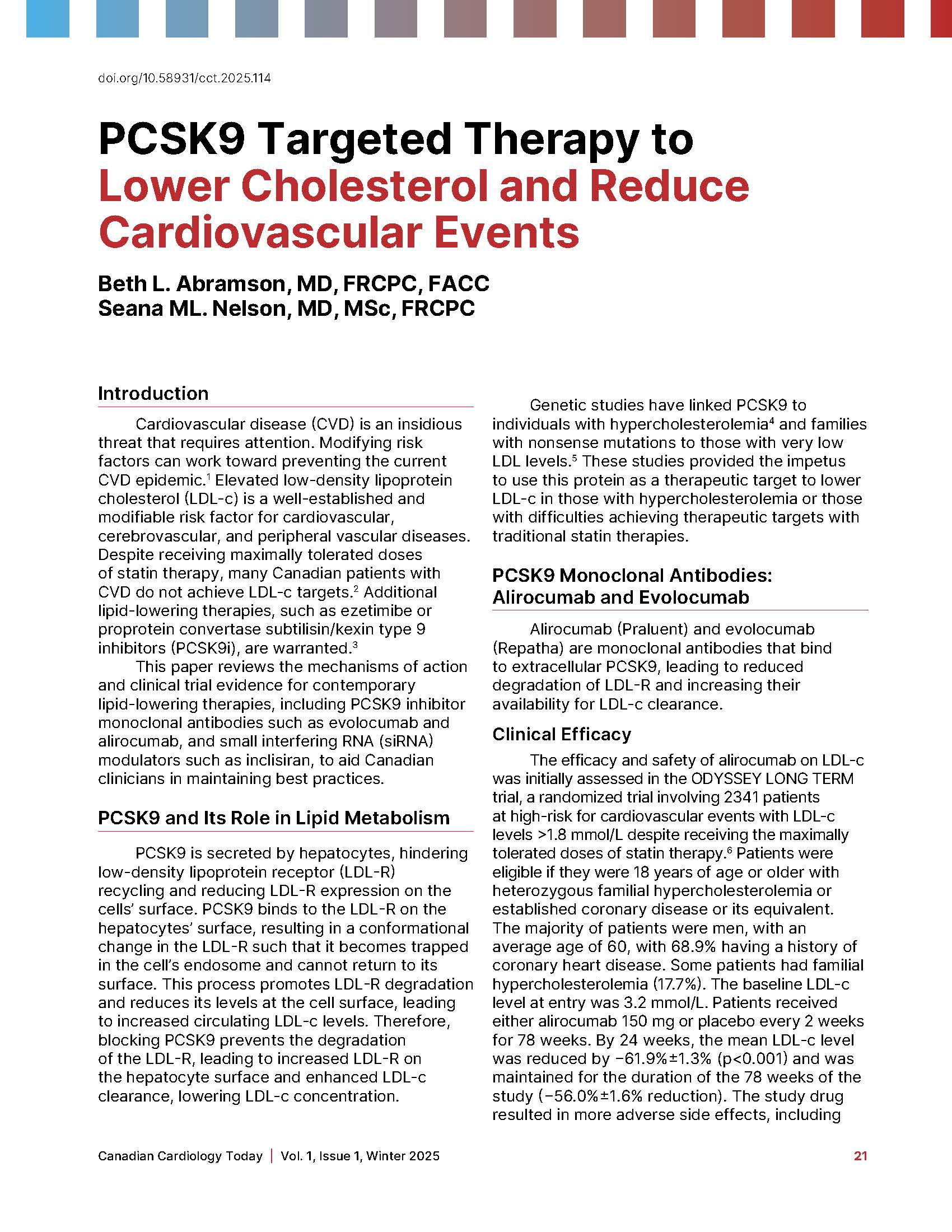PCSK9 Targeted Therapy to Lower Cholesterol and Reduce Cardiovascular Events
DOI:
https://doi.org/10.58931/cct.2025.114Abstract
Cardiovascular disease (CVD) is an insidious threat that requires attention. Modifying risk factors can work toward preventing the current CVD epidemic. Elevated low-density lipoprotein cholesterol (LDL-c) is a well-established and modifiable risk factor for cardiovascular, cerebrovascular, and peripheral vascular diseases. Despite receiving maximally tolerated doses of statin therapy, many Canadian patients with CVD do not achieve LDL-c targets. Additional lipid-lowering therapies, such as ezetimibe or proprotein convertase subtilisin/kexin type 9 inhibitors (PCSK9i), are warranted.
This paper reviews the mechanisms of action and clinical trial evidence for contemporary lipid-lowering therapies, including PCSK9 inhibitor monoclonal antibodies such as evolocumab and alirocumab, and small interfering RNA (siRNA) modulators such as inclisiran, to aid Canadian clinicians in maintaining best practices.
References
Abramson BL, Grégoire J. The Challenges of Contemporary Atherosclerotic Cardiovascular Disease Management. Can J Cardiol. 2024;40(8s):S1-s3. doi:10.1016/j.cjca.2024.03.019 DOI: https://doi.org/10.1016/j.cjca.2024.03.019
Goodman SG, Langer A, Bastien NR, McPherson R, Francis GA, Genest JJ, Jr., et al. Prevalence of dyslipidemia in statin-treated patients in Canada: results of the DYSlipidemia International Study (DYSIS). Can J Cardiol. 2010;26(9):e330-335. doi:10.1016/s0828-282x(10)70454-2 DOI: https://doi.org/10.1016/S0828-282X(10)70454-2
Pearson GJ, Thanassoulis G, Anderson TJ, Barry AR, Couture P, Dayan N, et al. 2021 Canadian Cardiovascular Society Guidelines for the management of dyslipidemia for the prevention of cardiovascular disease in adults. Can J Cardiol. 2021;37(8):1129-1150. doi:10.1016/j.cjca.2021.03.016 DOI: https://doi.org/10.1016/j.cjca.2021.03.016
Abifadel M, Varret M, Rabès JP, Allard D, Ouguerram K, Devillers M, et al. Mutations in PCSK9 cause autosomal dominant hypercholesterolemia. Nat Genet. 2003;34(2):154-156. doi:10.1038/ng1161 DOI: https://doi.org/10.1038/ng1161
Cohen JC, Boerwinkle E, Mosley TH, Jr., Hobbs HH. Sequence variations in PCSK9, low LDL, and protection against coronary heart disease. N Engl J Med. 2006;354(12):1264-1272. doi:10.1056/NEJMoa054013 DOI: https://doi.org/10.1056/NEJMoa054013
Robinson JG, Farnier M, Krempf M, Bergeron J, Luc G, Averna M, et al. Efficacy and safety of alirocumab in reducing lipids and cardiovascular events. N Engl J Med. 2015;372(16):1489-1499. doi:10.1056/NEJMoa1501031 DOI: https://doi.org/10.1056/NEJMoa1501031
Goodman SG, Steg PG, Poulouin Y, Bhatt DL, Bittner VA, Diaz R, et al. Long-term efficacy, safety, and tolerability of alirocumab in 8242 patients eligible for 3 to 5 years of placebo-controlled observation in the ODYSSEY OUTCOMES Trial. J Am Heart Assoc. 2023;12(18):e029216. doi:10.1161/jaha.122.029216 DOI: https://doi.org/10.1161/JAHA.122.029216
Blom DJ, Hala T, Bolognese M, Lillestol MJ, Toth PD, Burgess L, et al. A 52-week placebo-controlled trial of evolocumab in hyperlipidemia. N Engl J Med. 2014;370(19):1809-1819. doi:10.1056/NEJMoa1316222 DOI: https://doi.org/10.1056/NEJMoa1316222
Schwartz GG, Steg PG, Szarek M, Bhatt DL, Bittner VA, Diaz R, et al. Alirocumab and cardiovascular outcomes after acute coronary syndrome. N Engl J Med. 2018;379(22):2097-2107. doi:10.1056/NEJMoa1801174 DOI: https://doi.org/10.1056/NEJMoa1801174
Giugliano RP, Pedersen TR, Saver JL, Sever PS, Keech AC, Bohula EA, et al. Stroke prevention with the PCSK9 (Proprotein Convertase Subtilisin-Kexin Type 9) inhibitor evolocumab added to statin in high-risk patients with stable atherosclerosis. Stroke. 2020;51(5):1546-1554. doi:10.1161/strokeaha.119.027759 DOI: https://doi.org/10.1161/STROKEAHA.119.027759
Bonaca MP, Nault P, Giugliano RP, Keech AC, Pineda AL, Kanevsky E, et al. Low-Density lipoprotein cholesterol lowering with evolocumab and outcomes in patients with peripheral artery disease: insights from the FOURIER Trial (Further Cardiovascular Outcomes Research With PCSK9 Inhibition in Subjects With Elevated Risk). Circulation. 2018;137(4):338-350. doi:10.1161/circulationaha.117.032235 DOI: https://doi.org/10.1161/CIRCULATIONAHA.117.032235
Abramson BL, Al-Omran M, Anand SS, Albalawi Z, Coutinho T, de Mestral C, et al. Canadian Cardiovascular Society 2022 Guidelines for peripheral arterial disease. Can J Cardiol. 2022;38(5):560-587. doi:10.1016/j.cjca.2022.02.029 DOI: https://doi.org/10.1016/j.cjca.2022.02.029
O’Donoghue ML, Giugliano RP, Wiviott SD, Atar D, Keech A, Kuder JF, et al. Long-term evolocumab in patients with established atherosclerotic cardiovascular disease. Circulation. 2022;146(15):1109-1119. doi:10.1161/circulationaha.122.061620 DOI: https://doi.org/10.1161/CIRCULATIONAHA.122.061620
Sanofi-aventis Canada. Product monograph including patient medication information PrPRALUENT®. Laval, Quebec, Canada: Sanofi-aventis Canada Inc. [Date of approval 2019 Jul 31]. Available from: https://pdf.hres.ca/dpd_pm/00052466.PDF
Amgen Canada. Product monograph including patient medication information PrRepatha® evolocumab injection. Mississauga, ON, Canada. [Authorization 2015 Sep 10; Revision 2023 Sep 27]. Available from: https://www.amgen.ca/-/media/Themes/CorporateAffairs/amgen-ca/amgen-ca/documents/products/en/repatha_pm.pdf
Raal FJ, Kallend D, Ray KK, Turner T, Koenig W, Wright RS, et al. Inclisiran for the treatment of heterozygous familial hypercholesterolemia. N Engl J Med. 2020;382(16):1520-1530. doi:10.1056/NEJMoa1913805 DOI: https://doi.org/10.1056/NEJMoa1913805
Ray KK, Wright RS, Kallend D, Koenig W, Leiter LA, Raal FJ, et al. Two phase 3 trials of inclisiran in patients with elevated ldl cholesterol. N Engl J Med. 2020;382(16):1507-1519. doi:10.1056/NEJMoa1912387 DOI: https://doi.org/10.1056/NEJMoa1912387
Ray KK, Troquay RPT, Visseren FLJ, Leiter LA, Scott Wright R, Vikarunnessa S, et al. Long-term efficacy and safety of inclisiran in patients with high cardiovascular risk and elevated LDL cholesterol (ORION-3): results from the 4-year open-label extension of the ORION-1 trial. Lancet Diabetes Endocrinol. 2023;11(2):109-119. doi:10.1016/s2213-8587(22)00353-9 DOI: https://doi.org/10.1016/S2213-8587(22)00353-9
Ray KK, Raal FJ, Kallend DG, Jaros MJ, Koenig W, Leiter LA, et al. Inclisiran and cardiovascular events: a patient-level analysis of phase III trials. Eur Heart J. 2023;44(2):129-138. doi:10.1093/eurheartj/ehac594 DOI: https://doi.org/10.1093/eurheartj/ehac594
Government of Canada. Summary basis of decision for leqvio Canada [Internet]. [updated 2025 Jan 16; cited 2024 Aug 9]. Available from: https://dhpp.hpfb-dgpsa.ca/review-documents/resource/SBD00556.
Brunham LR, Lonn E, Mehta SR. Dyslipidemia and the current state of cardiovascular disease: epidemiology, risk factors, and effect of lipid lowering. Can J Cardiol. 2024;40(8s):S4-s12. doi:10.1016/j.cjca.2024.04.017 DOI: https://doi.org/10.1016/j.cjca.2024.04.017

Downloads
Published
How to Cite
Issue
Section
License
Copyright (c) 2025 Canadian Cardiology Today

This work is licensed under a Creative Commons Attribution-NonCommercial-NoDerivatives 4.0 International License.

